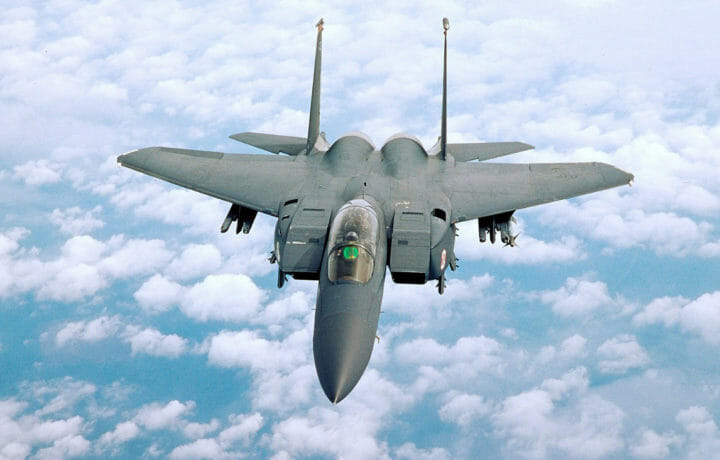Video games aren’t always known for realism – actual warfighters don’t “respawn,” a med kit won’t instantly heal anyone, and tanks need more than a wrench to be repaired. And let’s not even get started on the “ragdoll physics” that is employed to make many shooter games feel more cinematic.
However, when it comes to the category of military vehicle simulations, some games are quite accurate in terms of a tank’s or aircraft’s capabilities and armament. When the games don’t quite get those details right, some players will present open-source materials to highlight what the game developers had gotten wrong – while in recent years, several have gone even further, posting classified information.
Earlier this month, the manuals for the McDonnell Douglas F-15E Strike Eagle and General Dynamics F-16 Fighting Falcon were posted on the forum for the online military simulation War Thunder. The leak for the F-15E reportedly consisted of numerous Operational Flight Program (OFP) software manuals, including those for flight controls, navigation, targeting, and even weapons systems.
The documents had apparently been published between 1998 and 2000 and pertained to OFP suite 3, which has been upgraded numerous times in the past two decades.
The other posted information was from the F-16’s flight manual, detailing the use of the AIM-120 Advanced Medium-Range Air-to-Air Missile (AMRAAM).
The posts have since been deleted by the game’s publisher, Gaijin Entertainment. However, screenshots of the discussions have spread across social media – a reminder that once something is put online, it is almost impossible for it to be completely removed.
Unclassified but Restricted
In this particular case, the forum moderators determined that the information about the F-15 and F-16 may have been declassified but was still restricted and disallowed by U.S. law, as well as the rules of the forum.
“We always delete posts containing classified or restricted information from our forum as soon as possible. We forbid our users to share documents like this on our platforms. We remind our users again and again that it’s both illegal and pointless, so they should never do that,” Anton Yudintsev, the founder of Gaijin Entertainment, told AeroTime.aero last week.
Too Much Information
The Hungarian-based game publisher has some experience removing classified or otherwise sensitive information about modern combat vehicles from its forum. As previously reported by ClearanceJobs, leaked classified military documents from the Chinese People’s Liberation Army (PLA) were shared on an online forum for the free-to-play vehicle combat simulator.
The posts from last June included details of the DTC10-125, an anti-tank round fielded by modern Chinese tanks. Many of the details about the ordnance were reportedly already well known, yet this was the first time that authenticating documentation had been seen outside of China.
Nearly a year earlier, details were leaked about the British Army’s Challenger 2 main battle tanks – the same vehicles that the British Ministry of Defense (MoD) has recently pledged to send to aid Kyiv. In addition, another gamer shared part of the manual for the Leclerc Serie 2MBT, which is now in service with the French military. Gaijin Entertainment had removed all of those posts as well.
“This is very serious,” said Dr. Robert Sanders of the National Security Department at the University of New Haven. “Any sharing of classified information can have grave consequences.”
Even though the manuals for the aircraft are far older than those for the main battle tanks, there is still a danger that an adversary could glean insight and information that hasn’t been publicly disclosed.
“This is giving away the means to reconstruct or possibly even reverse engineer this equipment,” Sanders, a retired U.S. Navy Judge Advocate General’s Corps (JAG Corps) Captain, told ClearanceJobs. “This can have serious repercussions.”
The dangers of sharing information on the weapons systems and capabilities of these aircraft can also have a human cost, warned Sanders.
“These aircraft are not drones,” he continued. “There are human pilots, so this isn’t just putting a multi-million dollar piece of hardware at risk. The other consideration is that these old platforms are still operated by U.S. allies and partners, and by sharing this online it is putting those pilots in harm’s way too.”
Gamers Want Authenticity
War Thunder was first released via an “open beta” in November 2012 – meaning that gamers could play it as it was still being developed. It was officially released in December 2016, initially as a military flight simulator – before it was expanded to include other military vehicles.
By early 2019, it had become one of the most played games on the online hosting service Steam, and some 70 million gamers have reportedly registered to play it across multiple platforms including the PC, Sony PlayStation 4 and PlayStation 5, Xbox One, Xbox Series X, and Shield Android TV.
The game features multiple modes but is known for its hardcore user base that takes part in its “Simulator Battles,” where the vehicles are modeled as accurately as possible. On the game’s forums, players have debated the accuracy, and that is what has led to some sharing of information – such as a Challenger 2 tanker actually uploading his vehicle’s manual to prove a point.
“Gamers may want this to be as realistic a simulation as possible, but in the process, they could endanger the actual military platforms,” warned Sanders. “This might not be about the new stealth aircraft but any information that gets out there should be seen as a concern. Gamers likely don’t understand the gravity of the situation or perhaps they don’t care. This is scary because their interest in society seems to fall below the thrill-seeking that comes from the game.”
As noted, the other danger is that the reaction from the publisher is never going to be quick enough to what shouldn’t be posted on these forums.
“Once it is posted, it is out there,” said Sanders. “How do you put the Genie back in the bottle?”




